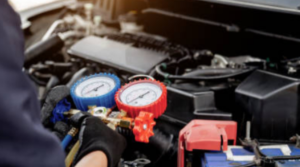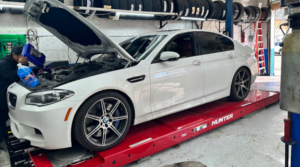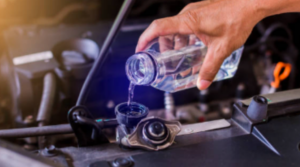Ah, on a scorching summer day the sweet relief of stepping into a cool, air-conditioned car – it’s a luxury we often take for granted.
But have you ever wondered how heat affects the car’s A/C system? How the weather will affect the car’s A/C depends on what kind of weather we’re talking about. Extreme temperatures can put a strain on it, and it’s essential to keep it running properly not only to beat the heat even also to ensure a comfortable driving experience. In this blog, we will discuss how weather affects the car’s AC system, how to maintain it in extreme temperatures, and where to repair your AC in Queens.
How Can the Weather Affect a Car’s AC System?
Air conditioning is supposed to help you escape from scorching heat. So, why can the heat negatively affect a car’s A/C? People live in a warmer climate where summers are extremely hot, they have experienced a faulty car A/C during those times. The car A/C system is protected from chilly weather so with colder temperatures, there’s not much to worry about.
Hot Temperatures
When it’s hot out, everyone relies on the car’s A/C system for relief from the heat. However, hot temperatures can negatively affect the car’s air conditioner. That’s because your car’s A/C has to work overtime to cool your vehicle when temperatures are high. In the car, the air conditioning system works by transforming a refrigerant gas into a liquid then it cools the interior of your cabin. It can be harder for the system to carry out this task when that gas is overheated. Car A/C’s life expectancy decreases when it works harder. That’s why people may find that their car A/C has more problems if they live in a hotter climate.
When the car air conditioner has to work harder to regulate the temperature of the vehicle or is used more frequently in hot weather, it uses more refrigerant. Because cooling down the car refrigerant is essential, a lack of it can cause warm air to blow out, which is not ideal for hot days.
Cold Temperatures
For the most part, cold weather doesn’t pose a threat to the car’s A/C system – in some countries. The only issue that may arise happens if the person periodically turns the air conditioning on during cooler periods. But the question is why would anyone use the A/C if there’s a real need to? Well, dust and bacteria can build up within the system when a car’s A/C sits unused for a long time. On top of that, inactive air conditioning systems can become faulty and corroded because of not being used periodically.
For obvious reasons, most people don’t turn on the air in cold weather. However, once warmer temperatures roll around again maybe you notice issues with your vehicle’s air conditioning, they may be because you haven’t used the A/C in a while. If that’s the case, the mechanics at the repair shop can help solve any leaks, potential electrical issues, or other problems that might be caused by infrequent use.
High Humidity
A/C systems work by pulling air from the outside to cool down your car. Car A/C has to remove the moisture from the air before circulating it through the system when humidity is high. This will cause stress on the car’s A/C unit. It can also prevent vehicle A/C from properly cooling the car, resulting in warm air blowing out of the vents.
If a car’s A/C is affected by humid weather, A/C repair shops can help diagnose and address the issue. Their team of ASE-certified mechanics can work quickly to fix the car A/C so that the customer has relief from hot, humid days.
Tips for Maintaining Car AC System in Extreme Temperatures
As you embark on your journey through the scorching desert or frosty tundra, for those ever-changing climates it’s crucial to ensure your trusty cooling system remains in tip-top shape. The key to maintaining optimal car AC performance in extreme temperatures lies in understanding how various factors affect its operation and how to take appropriate measures to address them. Below we mention some of the factors:
- Regular Maintenance: A well-maintained car AC system is more likely to withstand extreme temperatures without causing discomfort for passengers or losing efficiency. Schedule routine check-ups with an AC repair shop in Queens that can assess various components such as compressors, evaporators, filters, condensers, and belts – all critical parts that could affect overall performance if not properly maintained.
- AC System Leaks: Within your car’s AC system extreme temperatures can cause hoses and seals to contract or expand, leading to potential leaks. For any signs of leakage, it’s essential to inspect your vehicle regularly, especially during seasonal changes when temperature fluctuations are most significant. If you detect a leak, promptly seek professional help from automotive AC repair near me to avoid further damage.
- Refrigerant Replacement: Over time, due to natural dissipation or leakage the refrigerant levels in your car’s AC system may drop. Low refrigerant levels can severely impact the performance of your air conditioning unit in extreme temperatures. Ensure that you replace the refrigerant levels and check them as needed according to the manufacturer’s recommendations.
You will keep your beloved automobile running at peak efficiency by following these three tips diligently while traversing through harsh conditions like freezing cold, sweltering heat waves, or what Mother Nature throws its way. During those long road trips ahead, it also ensures optimal comfort!
Call Us to Address Weather-Related Car AC Issues
When the weather is affecting your car’s air conditioning and you are searching for car AC shops near me, don’t hesitate to call A/C repair mechanics at our shop. Our team will do their job properly to keep your vehicle cool in the heat and humidity. So you will be proactive with proper AC care and enjoy comfortable drives in any weather condition. Give us a call today at the mentioned number or visit our website to read our customer testimonials






